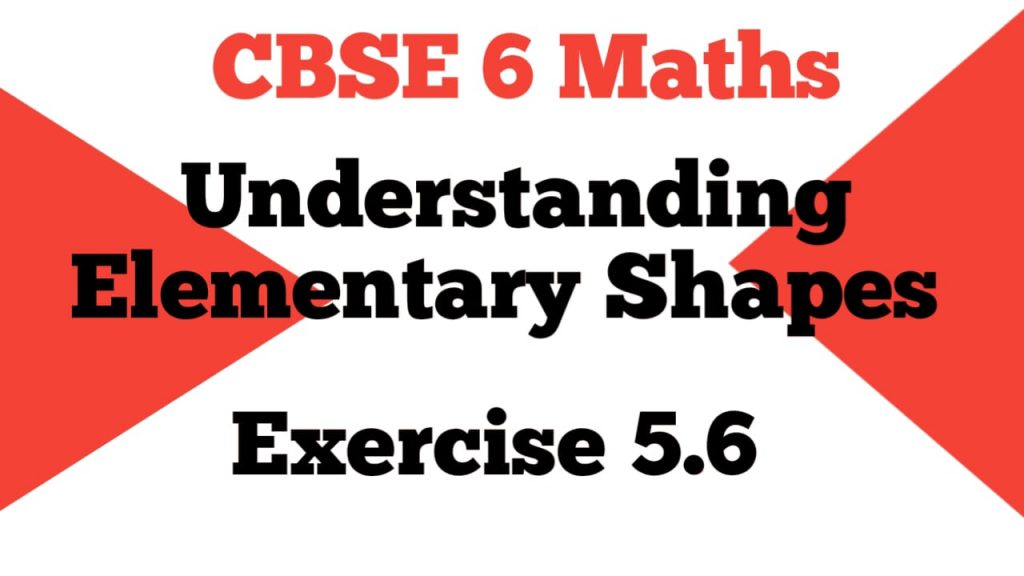Understanding Elementary Shapes
Exercise 5.6
1). Name the types of following triangles:
(a). Triangles with lengths of sides 7 cm, 8 cm and 9 cm.
(b) ∆ABC with AB = 8.7 cm, AC = 7 cm and BC = 6 cm.
(c). ∆PQR such that PQ = QR = PR = 5 cm.
(d). ∆DEF with m∠D = 900
(e). ∆XYZ with m∠Y= 900 and XY = YZ.
(f). ∆LMN with m∠L = 300, m∠M = 700 and m∠N= 800.
Answers:
(a). Triangles with lengths of sides 7 cm, 8 cm and 9 cm.
Scalene triangle.
(b) ∆ABC with AB = 8.7 cm, AC = 7 cm and BC = 6 cm.
Scalene triangle.
(c). ∆PQR such that PQ = QR = PR = 5 cm.
Equilateral triangle.
(d). ∆DEF with m∠D = 900
Right-angled triangle.
(e). ∆XYZ with m∠Y= 900 and XY = YZ.
Right-angled isosceles triangle.
(f). ∆LMN with m∠L = 300, m∠M = 700 and m∠N= 800.
Acute angled triangle.
2). Match the following:
Measures of Triangles Types of Triangle
(i). 3 sides of equal length (a). Scalene
(ii). 2 sides of equal length (b). Isosceles right-angled
(iii). All sides are of different lengths (c). Obtuse angled
(iv). 3 acute angles (d) Right-angled
(v). 1 right angle (e). Equilateral
(vi). 1 obtuse angle (f). Acute angled
(vii). 1 right angle with two sides (g). Isosceles
of equal length.
Answers:
(i). 3 sides of equal length – Equilateral
(ii). 2 sides of equal length – Isosceles
(iii). All sides are of different lengths – Scalene
(iv). 3 acute angles – Acute angled
(v). 1 right angle – Right-angled
(vi). 1 obtuse angle – Obtuse angled
(vii). 1 right angle with two sides of equal length – Isosceles right-angled
3). Name each of the following triangles in two different ways: (you may judge the nature of the angle by observation).



(a). acute-angled isosceles triangle.
(b). right-angled and scalene triangle.
(c). obtuse-angled isosceles triangle.
(d). right-angled isosceles triangle.
(e). acute angled and equilateral triangle.
(f). obtuse angles and scalene triangle.
4). Try to construct triangles using match sticks. Some are shown here. Can you make a triangle with
(a). 3 matchsticks?
Yes.
(b). 4 matchsticks?
No, not possible.
(c). 5 matchsticks?
Yes.
(d). 6 matchsticks?
Yes.
(Remember you have to use all the available matchsticks in each case). Name the type of the triangle in each case. If you cannot make a triangle, think of the reason for it.)
Points to Remember
1). If all the angles in a triangle are equal, then its sides are also equal.
2). If all the sides in a triangle are equal, then its angles are also equal.
3). If two sides of a triangle are equal, it has two equal angles.
4). If none of the angles of a triangle are equal then none of the sides are equal.
5). If the three sides of a triangle are unequal then, the three angles are also unequal.
6). A triangle having all three unequal sides is called a scalene triangle.
7). A triangle having two equal sides is called an isosceles triangle.
8). A triangle having all three equal sides is called an equilateral triangle.
9). If each angle is less than 900, then the triangle is called an acute-angled triangle.
10). If anyone angle is a right angle then the triangle is called a right-angled triangle
11). If anyone angle is greater than 900, then the triangle is called an obtuse-angled triangle.
12). Equilateral triangle is also equiangular, the measure of each angle is always 600.
13). Equilateral triangle is always an acute-angle triangle.
14). Isosceles triangle can be an acute-angled, right-angled and obtuse-angled triangle.
15). Scalene triangle can be an acute-angled, right-angled and obtuse-angled triangle.
Click here for the solutions of
![]()
